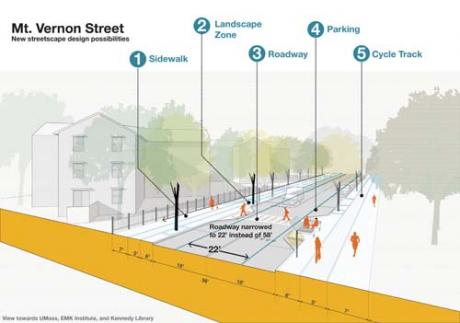August 23, 2012
 Mt. Vernon concept: A non-profit aligned with Corcoran Jennison envisons narrowing a wide Mt. Vernon St. and installing a “cycle track” for bicyclists.
Mt. Vernon concept: A non-profit aligned with Corcoran Jennison envisons narrowing a wide Mt. Vernon St. and installing a “cycle track” for bicyclists.
Executives at Corcoran Jennison Companies are planning the construction of a six-story apartment building at the intersection of Mt. Vernon St. and Morrissey Boulevard. A nonprofit funded by developer is also in the conceptual stages of potentially remaking Mt. Vernon St. through the expansion of sidewalks and creation of space for bicycles.
The proposed new building, with 200 units and retail space on the ground floor, would effectively serve as an entryway into the Columbia Point peninsula, which is already home to the Harbor Point apartment community, UMass Boston, the John F. Kennedy Presidential Library and Boston College High School, among other institutions.
While no plans have been formally filed with City Hall, Corcoran Jennison executives have been in discussions with the Boston Redevelopment Authority, the city’s planning agency, and have made a presentation about their ideas for Mt. Vernon St. to Columbia Point Associates, a collection of organizations on the peninsula.
The plans would closely track the vision outlined by a master planning task force in 2011, with more of a pedestrian-friendly layout and anticipating an increase in the number of residents. The proposed residential building, primarily geared towards graduate students and young professionals, would be located across from the office complex owned by Corcoran and Jennison, according to Michael Corcoran, a top executive at the company.
The existing office building, which is adjacent to the former Bayside Expo Center, houses the offices of Corcoran Jennison, the state’s Office of Vital Statistics, the Dorchester Reporter and its sister papers and the SEIU 1199 union.
The proposed apartments would contain one bedroom or two bedrooms, Corcoran said. The building would have parking in the basement of the building and under a planned courtyard. The building may also include a gym.
Asked about a timeline for the project, which could cost in the area of $60 million, Corcoran said, “We’re of the mindset of sooner rather than later.”
Tad Read, a senior planner at the Boston Redevelopment Authority who helped oversee the Columbia Point master planning process, said the property such as the one Corcoran Jennison is proposing is “pivotal” and among “the most visible sites” on Columbia Point.
“You could say it’s a gateway to Columbia Point,” he said.
Retail space would “animate” the ground floor, he said.
As for the overall master plan for Columbia Point, “we do have to be patient because we don’t have control over the market,” he said.
The nonprofit funded by Joseph Corcoran, TACC, is also eyeing a revamp of Mt. Vernon St. Concepts the organization outlined in a June presentation to neighbors include narrowing the street – which is more than 60 feet from sidewalk to sidewalk at points and adding dedicated bicycle lanes that would be set back from the roadway. Another feature is a 22 foot long crosswalk near the McCormack Middle School, according to Neil McCullagh, TACC director, who said traffic-calming measures are needed around the school.
“Right now it’s a highway,” McCullagh said, noting that about 100 children who go to school live across the street in the Harbor Point apartments.
This is hardly the first time the company has attempted to reshape Columbia Point. The development firm has won high praise for its conversion of the 1,500-unit public housing project located in the neighborhood, once plagued by abandonment, violence and decay, into mixed-income housing in 1979. The company also built a newer residential complex, The Peninsula, closer to the UMass-Boston campus in 2005.
In 2007, Corcoran Jennison had proposed a sweeping $1 billion plan, which included mixed-used housing and retail for the former Bayside Exposition Center, which it then owned. But economuy faltered and the company subsequently lost control of the property to foreclosure. In 2010, UMass Boston purchased the Bayside property. The site will likely function as parking spaces for the next several years, as campus officials focus on building academic buildings and dormitories as part of its own master plan.
Villages:
Topics:


